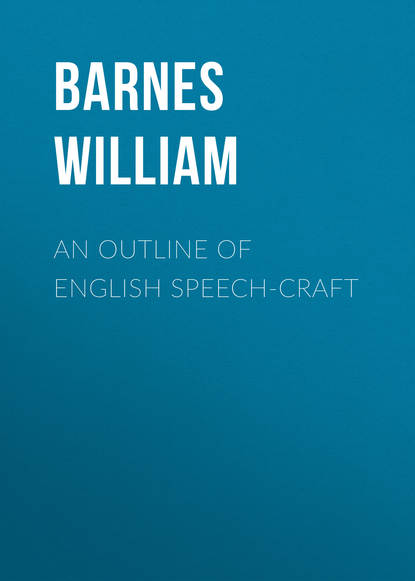По всем вопросам обращайтесь на: info@litportal.ru
(©) 2003-2024.
✖
An Outline of English Speech-craft
Настройки чтения
Размер шрифта
Высота строк
Поля
Literature. Book-lore.
Lithography. Stone-printing.
Locative (case). L. locus, stead, place. The stead or stow-case; as, ‘In London,’ ‘At church.’
Logic. Redelore.
-m, – om, – um. A word-ending, a form of the Greek one -ma, as in prag-ma, from prasso; and of the Latin -men, as in flu-men, from fluo. Words so ended meant mostly the outcome of the time-word, and were at first thing-names; and so as time-words they were, as most of them yet are, weak ones. From roots ending, I believe, in -ing came[5 - The words of the latter row are not shapen, at once, from those of the first one. Such of the first as are not roots in -ing are fellow stems to the others. As, stem from the root sting, to be more or less stiff or steadfast: sting, a stang, a stake, a stick. Steg-me (Gr. stigma), stegm (stem). Stem is not from stick, but from the root.]
Примечание 1[6 - In Welsh avon, a river, is from a time-word meaning to go on.]
Machine. An old English word for a machine is ginny or jinny which seems to be a fellow-stem to gin, and to mean to go, not as in onfaring (locomotion), but as in the way of a machine.
Magnificent. High-deedy, high-doing.
Magniloquent. High-talking.
Mechanics. Matter-might.
Metalepsis. Gr. metalambano, to take over. A use-shifting of a word, a taking of a word over from its common to another meaning; as, ‘Seven harvests ago’ for ‘seven summers or years.’
Metaphor. Gr. metaphora, from metaphero to carry over. A figure of speech, the overcarrying of a name from a thing to which it belongs to another to which it does not belong; as, ‘The Shepherd of Israel’ for ‘the Lord.’ ‘The father of the people’ for ‘a good king.’ ‘Eos Cymru’ (the Welsh nightingale) for ‘a fine Welsh songstress.’ ‘A man burning with anger.’
Metathesis. Gr. meta, with or against; thesis, a putting. A penning-shift, as that of putting each of two pennings in the stead of the other; as, waps, wasp; haps; hasp; though the first of the two shapes is the older in English.
Metathesis is where a word
Shifts pennings, as in crud for curd.
Meteor. Welkin-fire.
Metonymy. Gr. meta, off; onoma, a name. An offnaming, name-shifting, a wording that puts for a thing-name the name of some belonging – whether cause or effect or aught else – of the thing; as, ‘He reads Horace’ for ‘his works.’ ‘He lives by the sweat of his brow’ for ‘work.’ ‘Land holden by the Crown’ (Queen). ‘The power of the pen’ for ‘writers.’
Miosis. Gr. meiōsis, a forlessening. A wording by which a thing is lessened off; as, ‘Will you give me a crumb of bread and a drop of drink?’
Miōsis, a lessening,
Makes of a great a smaller thing.
Monitor. A warner. Ware-en-er, who makes ware.
Monosyllable. A breath-sound.
Multiloquous. Wordy, talksome.
Negative (word). L. nego, to deny. Fornaysome.
Nomenclature. Benaming, name-shapening.
Nominative. L. nomen, a, name. The name-case, speech-case.
Noun. L. nomen, a name; Fr. nom. A thing-name, thing-word, name-word.
Objective. Objective case. A name commonly given to the time-giving thing when it is not the speech-case.
Onomatopœia. A mocking name. The making of words from sounds; as, to hiss, a peewit or cuckoo from the sound it makes.
Optative (mood). The wish mood; as, ‘Oh! that I had wings.’ ‘May you be happy.’
Out- (a fore-eking). Outban, exile; outfaring, peregrination, exodus; outhue, outliken, depict or draw.
Over- (a fore-eking). Overbold, audacious; overhang, impend; overweigh, preponderate.
-p, -b, -f (endings). They mean small in kind or short in time: – Poke, pop, poke quickly; dip, a small dive; slip, a small slide; rip, to rive quickly.
Palindrome. Gr. palin, back; dromos, a running. A set of words which read the same backwards as forwards; as, ‘Lewd did I live, evil I did dwel,’ or ‘Roma tibi subito motibus ibit amor.’
A palindrome’s the same as read
From head to tail, or tail to head.
Palpitate. Throb.
Panacea. Allheal.
Paradigm. Gr. paradeigma, an offshowing, outshowing, a plan. A table of word-shapes.
Paragogē. An outbringing or outlengthening of a word.
A paragogē will be found
Where words are lengthened by a sound.
‘Such a sweet pett as this
Is neither far nor neary.
Here we go up, up, up;
Here we go down, down, downy.
Here we go backwards and forwards,
And here we go round, round, roundy.’
Old Song
‘In playhouses, full six-o,
One knows not where to fix-o.’
Old Song
Paragraph. An offwriting, a wording-share; such a share of a piece of writing as, if it were offwritten, would not want anything of a full meaning.
Paraphrase. New bewording; a turning of a piece of writing into other words, often more if not clearer than those of the writer. A paraphrase, while it is meant to clearen, may falsen the paraphrased matter. The following paraphrase from an old written sermon of (as I believe) an old Dorset divine, may be a good sample of new bewording: —
‘God, I thank Thee, that I am not as other men are, extortioners, unjust, adulterers, or even as this Publican: I fast twice in the week, I give tithes of all that I possess.’





